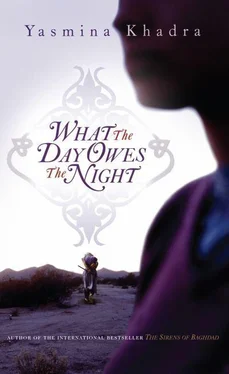My father wasn’t listening; he already despised the man. As he set about tidying our new home, I saw my uncle take the broker aside and slip something into his hand.
‘That should cover the rent for a while.’
The broker held the banknote up against the sunlight and looked at my uncle with malicious joy. He pressed the money to his forehead, then to his lips and yelped.
‘Money might have no smell, but my God, it smells good to me.’
MY FATHER wasted no time. He was determined to get back on his feet as soon as possible. At dawn next day, he took me with him and we went looking for any work that might bring in a few pennies. Unfortunately, he knew nothing about the city and didn’t know where to start. At nightfall we came back empty-handed and exhausted. Meanwhile, my mother had cleaned our hovel and organised our things. We ate like animals and fell asleep immediately.
The following day, before daybreak, my father and I set out again to look for work. We had been walking for hours when we saw a crowd of men milling around a truck.
‘What’s going on?’ my father asked a beggar in tattered rags.
‘They’re looking for labourers to unload cargo on the port.’
Convinced this was his lucky break, my father told me to wait on the terrace of an ancient ramshackle café and piled into the crowd. I watched him elbow his way through and disappear into the throng. When the truck pulled away, there was no sign of him; he had obviously managed to get aboard.
I waited for him for hours under the blazing sun. All around me, people in rags and tatters clustered around shacks, squatting on their haunches, perfectly motionless in the shade of their makeshift shelters. Every one of them had vacant eyes and something of the night in their faces. They seemed to be waiting, with unfathomable patience, for something that would never happen. In the evening, weary of waiting, they drifted away in silence, leaving only a few tramps, two or three gibbering madmen and sinister men with reptilian eyes. Suddenly I heard someone shout, ‘Stop, thief!’ and it was as though Pandora’s box had been opened. Heads jerked, bodies uncoiled like springs and I watched a handful of hirsute men swoop on a young lad in rags trying to escape. This was the thief. In the blink of an eye, they had lynched him. His screams would haunt my sleep for weeks to come. When they had finished, all that remained was the broken body of a teenage boy lying in a pool of blood. I was so shocked that when a man leaned down to speak to me, I almost jumped out of my skin.
‘I didn’t mean to scare you, lad,’ the man said, holding his hands up to reassure me, ‘but you’ve been here since morning. You need to be heading home now. This is no place for the likes of you.’
‘I’m waiting for my father,’ I said. ‘He went on the truck.’
‘Where is he then, this fool of a father of yours? What is he thinking, leaving a little lad like you in a place like this? Do you live far?’
‘I don’t know.’
The man seemed embarrassed. He was big, strapping, with hairy arms, a face weathered by the sun and one black eye. He glanced around him, then, reluctantly, he pushed a seat towards me and invited me to sit with him at his table, which was black with dirt.
‘It’ll be dark soon, and I have to close up. You can’t hang around here, got it? It’s not safe. The place is crawling with lunatics . . . Have you eaten?’
I shook my head.
‘I didn’t think so.’
He stepped inside his café and brought out a tin plate with some cold congealed soup at the bottom.
‘I’ve no bread left . . .’
He sat down next to me and watched as I lapped at the plate like a dog with his bowl.
‘Your father is a fool,’ he sighed.
It grew dark. The café owner closed up but he didn’t leave. He hung a lantern from a beam and, scowling, kept me company. Shadows flitted here and there across the murky square. A throng of homeless people gradually took over the area; some clustered around a wood fire, others simply stretched out on the ground and slept. Hours went by, the sounds faded; my father had still not returned. As time passed, the café owner’s fury mounted. He wanted to head home but was convinced that if he left me, even for a moment, I would be dead. When my father finally appeared, ashen with worry, the café owner laid into him in no uncertain terms.
‘Where the hell do you think you are? Mecca? What on earth possessed you to leave your kid in a place like this? Even criminals aren’t safe around here.’
My father was so relieved to find me safe that he drank down the café owner’s rebuke like a blessed elixir. He realised that he had made a grave mistake and that had the café owner left me to my fate, he might not have found me at all.
‘I went in the truck,’ he stammered, distraught. ‘I thought they were going to bring us back here, but I was wrong. I’m not from the city and the port is farther than I thought. I didn’t know where I was or how to get back here. I’ve been going round and round in circles for hours.’
‘You’re not right in the head is what it is,’ roared the café owner, unhooking the lantern. ‘If you’re out looking for work, you leave your kid at home . . . Now follow me, the pair of you. We’re about to cross the most vicious viper pit the good Lord ever put on this earth.’
‘Thank you, my brother,’ said my father.
‘Nothing to thank me for. I just don’t like to see a kid hurt is all. I’d have stayed here with him till morning if I had to or he’d never have made it out of this hole alive, and I wouldn’t have that on my conscience.’
He led us through the cut-throat alleys without a hitch, explaining as we walked how to avoid the worst areas and make it home in one piece, then disappeared into the shadows.
My father followed the café owner’s advice to the letter. After that day, he was gone by the time I woke up every morning, and I was asleep before he got home at night.
I no longer saw him.
I missed him.
There was nothing for me to do in Jenane Jato. I was bored. Having been brought up a solitary boy with only an old dog for company, I did not know how to join in the games of the horde of children who constantly squabbled in the courtyard. They were like poltergeists. They were younger than I was – some barely came up to my knees – yet they made more noise than a pack of demons. Sitting on the step of our room, I would watch them, keeping a safe distance from their savage games that invariably ended with a head split open or a knee grazed.
We shared our courtyard with five other families, all of whom had come from the hinterland: bankrupt landowners or khammès – tenant farmers – who had defaulted on their lease. The men would leave at daybreak to find work and the women, indifferent to their children’s vicious brawls, would spend their days attempting to make a filthy hovel into a home. They seemed to believe this was a lesson in the nasty, brutish ways of life, one their children should learn as soon as possible. They seemed almost happy to watch as, again and again, the children lashed out at one another, then, after a good cry, made up again only to hurl themselves back into the fray with astonishing ferocity. The women stuck together, they supported each another: if one was ill, the others would make sure there was food in her pot, look after her baby, take turns sitting by her bedside. From time to time they would share something sweet, and with touching simplicity, they seemed inured to their hardship. For this, I admired them.
There was Badra, a hefty, strapping woman who loved to tell dirty stories. She was a breath of fresh air. Her crude language made my mother uncomfortable, but the other women loved it. Badra was mother to five little brats and two awkward teenagers. She had been married, to a shepherd thick as two short planks, who, she liked to say, had a dick like a donkey and no idea how to use it . . . There was Batoul, slight and skinny with hair as black as cloves, who, barely forty, seemed like an old woman; she would squirm with laughter before Badra even opened her mouth. As a girl, Batoul had been forced to marry a man old enough to be her grandfather. She claimed to have supernatural powers – she would read palms and interpret dreams. The women in the neighbourhood regularly came to her for advice. For a handful of potatoes, a franc or a sliver of soap, she would tell their future. For the people who lived around the courtyard, she did it for free . . . There was Yezza, a plump, red-haired woman with a magnificent bosom whose alcoholic husband regularly hit her. Her ruined face bore the marks of his constant beatings and she had barely a tooth left in her head. Her ‘crime’ was her failure to bear him children, something that made him particularly loathsome . . . There was Mama, who, though she had enough to worry about with her brood of children, had the energy of a dozen men and was prepared to do anything to keep a roof over their heads . . . And then there was Hadda, beautiful as a houri, who already had two children, though she was barely in her teens. Her husband had set off to look for work one morning and never come back. Left to herself, with no means of support, she owed her continued survival to the solidarity of the women who shared the courtyard.
Читать дальше












